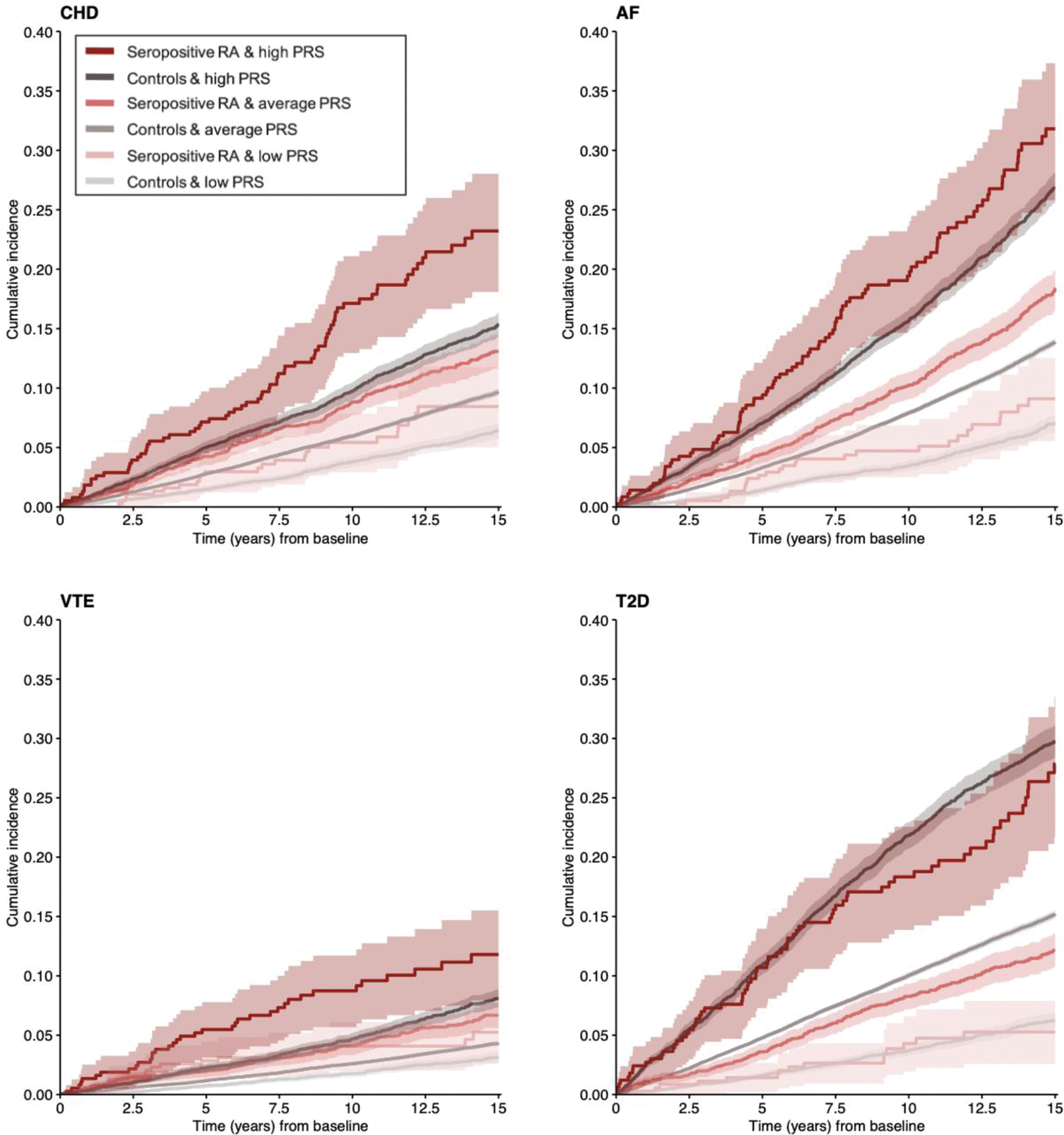

Background: Rheumatoid arthritis (RA) is associated with increased risk for cardiometabolic diseases [1-3], but the role of genetics on the risk for these comorbidities is poorly understood. Polygenic risk scores (PRS) of cardiometabolic diseases have demonstrated strong associations with their respective diseases [4, 5], but their impact on the risk of cardiometabolic comorbidities in rheumatic diseases has not been evaluated.
Objectives: To assess the impact of cardiometabolic PRSs on the risk of cardiometabolic comorbidities in patients with seropositive RA.
Methods: Seropositive RA patients participating in the FinnGen study diagnosed at the age of 40 or above between 2000-2017 were identified from healthcare registries (n=4007). Each patient was matched based on age and sex with twenty controls without any rheumatic condition. Cumulative incidences and hazard ratios for major coronary heart disease event (CHD), atrial fibrillation/flutter (AF), venous thromboembolism (VTE), and type 2 diabetes (T2D) were calculated for different PRS categories following RA diagnosis.
Results: PRSs were strongly associated with their respective cardiometabolic diseases in patients with seropositive RA and controls. RA patients demonstrated a slightly higher cumulative incidence of all cardiometabolic diseases compared to controls across all PRS categories, except for T2D in which the cumulative incidence was lower (Figure 1). Risk for all cardiometabolic diseases was elevated among RA patients with high respective PRSs, whereas low PRS compensated for the impact of RA on the disease risk, even when adjusted with demographic and clinical risk factors. Furthermore, PRSs demonstrated higher impact on the risk for cardiometabolic comorbidities than RA diagnosis.
Conclusion: Common genetic variants impacting risk of cardiometabolic diseases combined into a single metric through PRSs, strongly predict the risk of cardiometabolic comorbidities in individuals with seropositive RA. PRSs have a considerably larger impact on the respective cardiometabolic disease risk than RA itself, and offers opportunities for improving cardiometabolic disease risk estimation in patients with RA.
Cumulative incidence and 95% confidence intervals of cardiometabolic diseases in different polygenic risk score (PRS) categories (>90%, high; 10-90%, average; <10%, low) among patients with seropositive rheumatoid arthritis (RA) and controls within 15 years of follow-up. CHD = coronary heart disease, AF = atrial fibrillation, VTE = venous thromboembolism, T2D = type 2 diabetes.

REFERENCES: [1] Hansildaar R, Vedder D, Baniaamam M et al. Cardiovascular risk in inflammatory arthritis: rheumatoid arthritis and gout. Lancet Rheumatol . 2021;3(1):e58-e70.
[2] Molander V, Bower H, Frisell T et al. Risk of venous thromboembolism in rheumatoid arthritis, and its association with disease activity: a nationwide cohort study from Sweden. Ann Rheum Dis . 2021;80(2):169-175.
[3] Aaramaa H-K, Mars N, Helminen M et al. Risk of cardiovascular comorbidities before and after the onset of rheumatic diseases. Semin Arthritis Rheum . 2024;65:152382.
[4] O´Sullivan JW, Ashley EA, Elliot PM. Polygenic risk scores for the prediction of cardiometabolic disease. Eur Heart J . 2023;44(2):89-99.
[5] FinnGen, Mars N, Koskela JT et al. Polygenic and clinical risk scores and their impact on age at onset and prediction of cardiometabolic diseases and common cancers. Nat Med . 2020;26(4):549-557.
Acknowledgements: This work was supported by research grants from Maire Lisko Foundation and The Finnish Cultural Foundation (H-K A), Academy of Finland and University of Helsinki HiLIFE Fellow grants (NM), and Competitive State Research Financing of the Expert Responsibility area of Tampere University Hospital (PI). We also want to acknowledge the participants and investigators of FinnGen study.
Disclosure of Interests: Hanna-Kaisa Aaramaa A lecture fee from Novartis, Pia Isomäki Consultant of Galapagos, Eli Lilly, Pfizer and ViforPharma, Anne Kerola Speaker fees from Boehringer-Ingelheim, Abbvie and Sanofi, Advisory boards of Pfizer and Boehringer-Ingelheim, Antti Palomäki Lecture fees from Boehringer-Ingelheim, Pfizer and Abbvie, Consulting fees from Boehringer-Ingelheim, Abbvie and Johnson&Johnson, Kari Eklund Lecture fees from Celltrion, Novartis and SOBI, Consulting fees from UCB, Finngen N/A The FinnGen project is funded by two grants from Business Finland and the following industry partners: AbbVie Inc, AstraZeneca UK Ltd, Biogen MA Inc, Bristol Myers Squibb (and Celgene Corporation & Celgene International II Sàrl), Genentech Inc, Merck Sharp & Dohme LCC, Pfizer Inc, GlaxoSmithKline Intellectual Property Development Ltd., Sanofi US Services Inc., Maze Therapeutics Inc., Janssen Biotech Inc, Novartis Pharma AG, and Boehringer Ingelheim International GmbH, Nina Mars: None declared.
© The Authors 2025. This abstract is an open access article published in Annals of Rheumatic Diseases under the CC BY-NC-ND license (